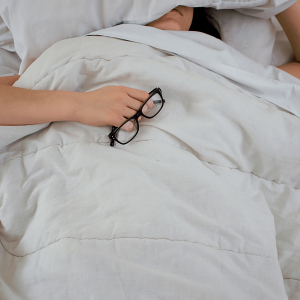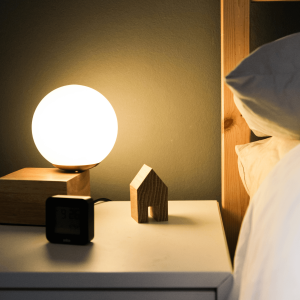Weed has always been a bit controversial, but as attitudes change, more people are curious about its effects, especially on sleep. So, what happens when you sleep high? We decided to find out.
When we talk about ‘sleeping high’, we mean resting or sleeping while under the influence of marijuana. It’s an interesting topic to consider for young adults, especially with cannabis becoming more accepted and legalized in different parts of the country.
Understanding how weed can affect our sleep patterns and the potential consequences or benefits is undoubtedly important. In this blog, we’ll dive into this fascinating topic and explore what really happens when you go down after your nightly smoke session. Let’s begin!
The Science of Sleep
Society has learned a lot about sleep through scientific research, especially when it comes to different sleep stages.
Each stage plays a vital role in the restorative functions of sleep, including the critical processes of memory consolidation and cellular repair, for example.
The Stages of Sleep
Sleep isn’t just one continuous state of unconsciousness but rather divided into different stages. Each stage is marked by unique brain wave patterns and physiological responses.
- Stage 1: This is the initial stage of light sleep where one drifts in and out of consciousness. It is characterized by slower breathing, slower heartbeat, and muscle relaxation.
- Stage 2: This marks the onset of true sleep. The sleeper’s heart rate slows further and body temperature drops in preparation for deep sleep.
- Stage 3 and Stage 4: Often grouped together, these stages mark the transition to deep sleep. Here, restorative processes like tissue repair and immune strengthening occur.
- Rapid Eye Movement (REM) Sleep: This is the stage of sleep most closely associated with dreaming. Despite the sleeper’s body being in a state of paralysis, brain activity levels are similar to those of a waking state.
Knowing these stages can help people improve their sleep and, in turn, boost their overall mental health and productivity.

Sleep and The Endocannabinoid System
Interestingly, recent studies have shed light on the role of the endocannabinoid system in sleep regulation.
This intricate cell-signaling system affects a bunch of physiological processes, like mood, appetite, and yes, sleep too. It’s thought that endocannabinoids can impact our sleep-wake cycles, which could give us new understanding and ways to treat sleep disorders.
Cannabis and Sleep
Cannabis has been getting more attention lately for its potential therapeutic effects, especially when it comes to improving sleep.
Contrary to what many people think, it’s not just about making you feel sleepy. The impact of cannabis on sleep is actually quite complex and significant.

How Cannabis Affects Sleep
Cannabinoids, the active components of cannabis, interact with the body’s endocannabinoid system – a complex network of receptors involved in regulating multiple physiological processes including sleep cycles and stress hormone regulation.
Specifically, Tetrahydrocannabinol (THC) has been found to promote sleep by increasing overall sleep time and reducing REM sleep, which is the stage of sleep most associated with dreaming.
Different Strains and Their Impact on Sleep
The effects of cannabis on sleep can vary depending on the strain used.
Indica strains, typically high in THC, are often associated with sedating effects and hence, are commonly used for promoting sleep.
Sativa strains, on the other hand, are generally more energizing and might not be the best choice for sleep.
Hybrid strains can provide a balance of effects, but individual responses can still vary based on the specific genetic makeup of the strain. If you were to choose a hybrid strain, we’d suggest sticking to indica-dominant varieties.
Dosage and Timing Considerations
When it comes to using weed for sleep, timing and dosage are crucial.
Using cannabis too early before bed might lead to a decrease in REM sleep, while late usage could potentially interfere with the sleep cycle. We’d suggest starting with low doses and gradually increasing as necessary, always closely monitoring for any adverse effects.
If you need additional guidance, consulting with a weed-friendly healthcare professional is highly recommended to determine the optimal regimen suited for your individual needs.
What Happens When You Sleep High: The Positives
Cannabis can be a powerful sleep aid, especially for those struggling with consistent sleep. Here’s how:
- Improved relaxation and stress reduction
One of the primary benefits of sleeping under the influence of cannabis is the enhanced relaxation it provides. The active compounds in cannabis, particularly THC and CBD, have been found to interact with the body’s endocannabinoid system. - As we know, the endocannabinoid system plays a crucial role in maintaining homeostasis, including our sleep and stress responses. This interaction helps the body to relax, reduce stress, and achieve a more peaceful and restful sleep, which can be particularly beneficial for those struggling with insomnia or other sleep disorders.
- Enhanced dream experiences
Sleeping while high can lead to some fascinating dream experiences. Some people have reported having more vivid and intense dreams, making it an interesting journey into the subconscious for those who enjoy analyzing dreams. - However, it’s worth noting that this can vary greatly from person to person, and some may have trouble remembering their dreams. Just like with any substance, the experience of sleeping under the influence of cannabis differs for everyone. So, approach it with an open mind and a sense of personal responsibility.

What Happens When You Sleep High: The Negatives
While cannabis is often praised for its potential benefits as a sleep aid, it’s also important to consider the potential downsides that may lead to poor sleep.
Let’s take a closer look at these possible drawbacks.
- Memory and Cognitive Impairment
Using cannabis as a sleep aid can come with some significant drawbacks, especially when it comes to memory and cognitive impairment.
Research suggests that smoking weed regularly may have a negative impact on cognitive functioning, including short-term memory and information-processing abilities. These impairments can lead to decreased cognitive performance and affect overall mental clarity.
- Dependence and Tolerance
Another potential drawback is the risk of developing dependency and an overly high tolerance when consuming cannabis before bed.
Over time, individuals may find that they require higher and higher doses to achieve the same sleep quality, leading to a form of reliance. This can make it challenging for them to sleep without smoking marijuana or taking an edible, which can pose difficulties when traveling or returning to their normal living environment. Additionally, this leads to possible dependence, which could cause withdrawal symptoms.

Risks and Precautions
While using cannabis for sleep may offer certain benefits like aiding sleep and relaxation, it’s also essential to acknowledge the potential safety concerns associated with its use before bedtime.
As mentioned, regular consumption of cannabis, especially in larger quantities, might lead to dependence. Additionally, there’s the risk of impaired functioning the following morning, including sluggishness and a decreased ability to concentrate.
However, for medical cannabis users, the rules are a bit different. It’s crucial to consult with a healthcare professional or a knowledgeable dispensary staff member to determine the most suitable strains and consumption methods, as well as timing for use.
Certain conditions might benefit from nighttime medical marijuana use, while others might not. Furthermore, potential interactions between cannabis and other medications need to be monitored closely. As always, moderation and mindful usage are key.
Alternatives and Strategies
Whether you’re taking a tolerance break or you find yourself experiencing negative effects as a result of consuming cannabis before bed, the following sections are for you.
So, if you’d like to put down the joint and avoid the taboo sleeping pill, keep reading!
Tips for Better Sleep Without Cannabis
Cannabis may be a common go-to for those seeking a good night’s sleep, but there are other natural sleep aids that can be just as effective as using marijuana.
Firstly, establish a regular sleep schedule by going to bed and waking up at the same time each day. This can regulate your body’s internal clock and may help to promote sleepiness. If your phone has a ‘sleep’ function that automatically sets your morning alarm and a ‘do not disturb’ function, we’d suggest setting that up ASAP!
Secondly, regular physical activity can significantly improve the quality of your sleep. It’s most effective when done daily and not too close to bedtime.
Lastly, to help you sleep well, relaxation techniques such as deep breathing, meditation, or yoga can help calm your mind and prepare you for sleep.
Sleep Hygiene Practices
Beyond tips for achieving better sleep without the use of substances, it’s essential to consider good sleep hygiene practices.
This could involve making your sleep environment as comfortable as possible. For example, keep your bedroom dark, quiet, and cool, and invest in a comfortable mattress, pillows, and bedding.
Limit exposure to screens like computers, tablets, and smartphones in the hours leading up to sleep as the blue light emitted can interfere with your body’s sleep-wake cycle.
Additionally, be mindful of your intake of caffeine, alcohol, or large meals close to bedtime as these can disrupt your sleep.

Conclusion
To sum it up, sleeping ‘high’ or falling asleep under the influence of cannabis can lead to a range of experiences, some of which may be helpful while others… not so much.
Takeaways include the potential for better sleep onset and deeper sleep stages, but also the chance of dependence, disrupted REM sleep, and even the potential to feel groggy the next day.
It’s worth noting that everyone’s response can actually differ quite a bit. So, if you decide to use cannabis for your sleep problems, it’s important to approach it responsibly.
Frequently Asked Questions
1. What are the benefits of sleeping high up?
Sleeping while under the influence of cannabis, or sleeping ‘high’, can have various potential benefits, but it’s important to remember that these effects are subjective. For many people, smoking cannabis can help them relax, reduce anxiety, and help them sleep.
Certain strains of cannabis are renowned for their sedative properties, offering natural relief for individuals struggling with insomnia or sleep disorders. These specific cannabis varieties contain relaxing compounds that promote a tranquil state of mind, allowing individuals to experience restful sleep and wake up feeling refreshed.
2. Can weed cause disruptions in my sleep cycle?
Yes, overuse of weed can potentially disrupt your sleep cycle. Some studies suggest regular or heavy use of marijuana may also result in shorter REM sleep stages, impacting the overall quality of sleep and making way for sleep disturbances.
3. Can I build a tolerance to weed before bed?
Yes, building a tolerance to weed when used consistently before bed is possible. This could lead to the need to smoke cannabis in larger doses to achieve the same effect, which can further disrupt sleep patterns.
4. Are there any potential side effects of using weed as a sleep aid?
Potential side effects of marijuana can include excessive daytime sleepiness, dependence, changes in dream patterns, and potential sleep disruptions if usage is stopped abruptly. Excessive daytime sleepiness may lead to difficulties in maintaining focus and productivity throughout the day.
Dependence, although relatively rare, can develop with prolonged and heavy use, resulting in withdrawal symptoms once stopped.
Changes in dream patterns may manifest as vivid or unusual dreams and sleep disruptions can occur when abrupt discontinuation of marijuana interrupts the body’s natural sleep-wake cycle. It is important to be aware of these potential effects for a well-informed and responsible approach to marijuana use.
5. Can anyone use weed to fall asleep?
Weed is not recommended for everyone even if an effective sleep aid. It’s important to consult with a healthcare provider before starting any new sleep aid regimen, including weed.

 Rewards
Rewards





